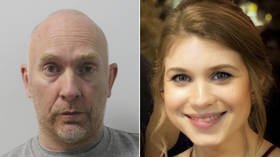Now it’s clear that women have to take the same s**t from Britain’s corrupt police as black men, maybe we’ll see some change
It’s appalling that it’s taken the horrific death of Sarah Everard to sharpen the focus on the systemic abuse of women by UK police. But as a black man, this gives me hope that the bad apples in the force will be rooted out.
As the culture war rages over gender identity, men with cervixes, ‘pregnant people’ and who has the right to abuse whom, an unlikely alliance may be emerging between two much maligned ‘minorities’ – women and black men.
The 2020 kidnapping and murder of Sarah Everard and the conviction last week of her killer, Metropolitan Police officer Wayne Couzens, has raised many serious and long-overdue questions. While the immediate focus in Britain, quite rightly, is on violence against women, cultural misogyny and the inability of senior and rank and file figures within the Met to weed out psychopaths within its ranks, as a black man I can’t help but say, “We told you so.”
Also on rt.com In the moral panic over Sarah Everard’s awful killing, we need to be careful not to brand all men and boys as violent misogynistsEver since the first black person to step off the HMT Windrush in 1948 got a shakedown from the boys in blue – simply for the crime of being ‘black in public’ – Britain’s black community has argued, lobbied, protested and yes, on occasion, rioted for the sort of civil and human rights the mainstream population takes for granted. Yet we constantly have to run to stand still.
Long before the racially-motivated murder of Stephen Lawrence in 1993 by a gang of white dirtbags, there was the murder of Kelso Cochrane, an Antiguan expat carpenter who had journeyed to the so-called ‘motherland’ in 1954 only to be stabbed to death five years later on the streets of Notting Hill, West London, by a similarly racist group of white youths.
Decades later, and despite obfuscation by corrupt elements within the Met – which allowed Stephen’s murderers to walk free for many years – the constant campaigning of his parents Neville and Doreen, activists within the black community and allies in the media including, curiously, the Daily Mail (along with the efforts of DCI Clive Driscoll who re-examined the case, in spite of attempts by colleagues to ‘sabotage’ his investigation), eventually led to the 2012 conviction of petty criminals Gary Dobson and David Norris, both of whom received life sentences for murder, at Her Majesty’s pleasure.
No such justice, however, was afforded to Kelso Cochrane. Over 60 years on from his murder, and despite accusations of a Met cover-up, as exposed in Mark Olden’s gripping investigation, ‘Murder in Notting Hill’, there have been no convictions, no public inquiries, not even a TV drama into a tragedy that has long since cast a shadow over the area’s celebrated boho, right-on credentials.
While Kelso and Stephen’s murders are indicative of the craven MO of racist attackers (in the absence of a firearm, a ratio of at least 4:1 seems to be the rule of engagement), and corrupt if not cowardly racist factions within the Met, in these instances the force is guilty of dereliction of duty, rather than intentional, unintentional or culpable homicide.
The same cannot be said, however, when it comes to the Met and deaths of ‘people of colour’ on its watch. According to Inquest, “custody and shooting deaths” at the hands of the Metropolitan Police from 1990 to date total 103, with serious assaults running into the thousands. In April, for instance, a Metropolitan Police officer was jailed for breaking a black father’s leg in front of his children after a judge said that the case was a “clear case of racial profiling.” Charlie Harrison, 39, attacked Carl Abrahams, 47, as he left a graveyard with his two sons, aged 13 and 16, who had been placing flowers on their mother’s grave in Forest Gate, East London, on New Year’s Eve 2018. Charming.
The list of such abuses of power is endless. Most go unreported. Plus ça change. Growing up in the East End in the 70s and 80s, taking a kicking from the ‘old bill’ was something of a rite of passage. In the absence of mobile phones to record beatings, sundry fit-ups and other corrupt practices, many black people had their lives ruined simply by having the misfortune to come into contact with rogue cops.
When we shouted that something was up, no one listened. When we answered back, let alone fought back, we were jailed for our troubles. And when we rioted, lip service was paid, hands were wrung, inquiries were held, reports were written and ‘lessons were learned’. But each and every time, the default is business as usual – when it comes to policing London’s black community, for too many sub-standard officers, the Met is an army of occupation and black people are the enemy.
Now, it has taken the murder of Sarah Everard and Met Commissioner Cressida Dick’s ludicrous suggestion that women should “flag down a bus” when confronted by a dodgy copper to bring the issue into sharp focus, when black people have had to put up with this s**t for decades.
What was 13-year-old schoolboy Benjamin Olajive meant to do as police officers attempted to choke him out during a stop-and-search in Streatham, South London last week, call an Uber? Or how about 70-year-old Errol Dixon, who was beaten to a pulp the week before after being pulled over by police officers for a broken brake light in Bromley, South East London. What should he have done, Commissioner Dick, summoned his chauffer to whisk him away in the Bentley? Or what about 20-year-old Rashan Charles who “accidentally died” while being restrained by anonymised police officer, “BX47” in a convenience store in Dalston, East London? Maybe he should’ve done what many coppers fantasise about – jumped on a plane to “f**k off back to where you come from.”
Before anyone starts fulminating that there is a clear distinction between the premeditated murder of Ms Everard and the tumult of extrajudicial assaults and killings of black men – not just by Met officers, but by police throughout Britain, for decades – and as such they are incomparable, a few things should be noted.
Under normal circumstances, the crazed act of an individual would not be the metric by which to measure any institution, system or indeed ethnic group. But this is exactly what we are being asked to do in the Couzens case – and with justification.
Within days of Couzens’ conviction, serving Met officer PC David Carrick was remanded in custody, accused of raping a woman he met on Tinder. In recent years, many women have come forward accusing Met officers of stalking, physical intimidation, sexual assault and violence. In April, the BBC revealed that a serving officer was under investigation for allegedly raping two female colleagues. Just this week, the Daily Mail reported that “26 Met Police colleagues of killer cop Wayne Couzens have been convicted of sex crimes since 2016.”
During the summer, a spreadsheet containing dozens of names of officers convicted of assorted serious crimes was leaked via WhatsApp. This was no hoax. All the names I researched stood up as legit. This welter of abuses of power blows any lone wolf theory out the window, leaving the Met facing the charge of systemic sexual abuse, and on the brink of its very own #MeToo scandal.
Earlier this year, the Met came under fire for its heavy-handed policing of a vigil held on Clapham Common, South London in Ms Everard’s memory, which at one point was even attended by the Duchess of Cambridge. At the same time, several Met officers were under investigation for the tawdry sharing of images via WhatsApp of the crime scene of double-murder victims, Nicole Smallman and Bibaa Henry. Much has been made about Nicole and Bibaa’s deaths garnering nowhere near the public sympathy or outrage, let alone retrospective handwringing from the Met that Ms Everard’s did, because they were women of colour and Sarah was white.
Ditto 38-year-old Jan Mustafa, who went missing for a year, only to be found dead in a freezer with another murdered woman, 34-year-old Henriett Szucs. Ditto 28-year-old Sabina Nessa. Ditto countless women of colour or foreign nationals or working-class women who are murdered in Britain and disappear down a cultural pecking order that treats them, and by extension females, period, with contempt. Raising this issue isn’t ‘race baiting’. It’s a fact. And one that cries out for people of colour and women across the board to view this as a shared struggle against police brutality, not another opportunity for politicians, social commentators and ideological grifters to divide and profit from.
Thanks to the popularisation of the ‘Karen’ meme, which people of colour, particularly Black Americans and Brits, but increasingly right-on white people, have used to satirise a certain type of ‘privileged’ white woman, it’s become fashionable to disregard the voice of the not-so-silent white female majority. This is a bad joke. Whatever the Karen meme says about the tensions extant in multicultural Britain, the fact remains that white British females make up the overwhelming majority of the 207 women murdered in the UK last year, the women killed by a man, on average, every three days, the one in three women who suffer domestic violence and the half a million women a year who are victims of sexual assault.
Also on rt.com The tragic murder of Sarah Everard shows we need to radically rethink our relationship with power and authority in BritainWhile psychopaths and British society go hand in hand, there is a caveat to all of this. As someone who has spent his career reporting on crime, policing and the security services, among other things, despite my own prejudices, I have nothing but respect for the overwhelming majority of officers who aim to protect and serve the British public, “without fear or favour” and “by consent” in the face of myriad pressures. Cressida Dick may well be in a tight spot, with left and right calling for her head. But if she listens to the 51% of the population that’s her sistren, heeds the black community’s existential concerns, and ‘gets on the bus’ with a root and branch audit of the Met, she may well find an intersectional solution to saving her job, the reputation of her force and crucially, the well-being of millions of Londoners.
Think your friends would be interested? Share this story!
The statements, views and opinions expressed in this column are solely those of the author and do not necessarily represent those of RT.














